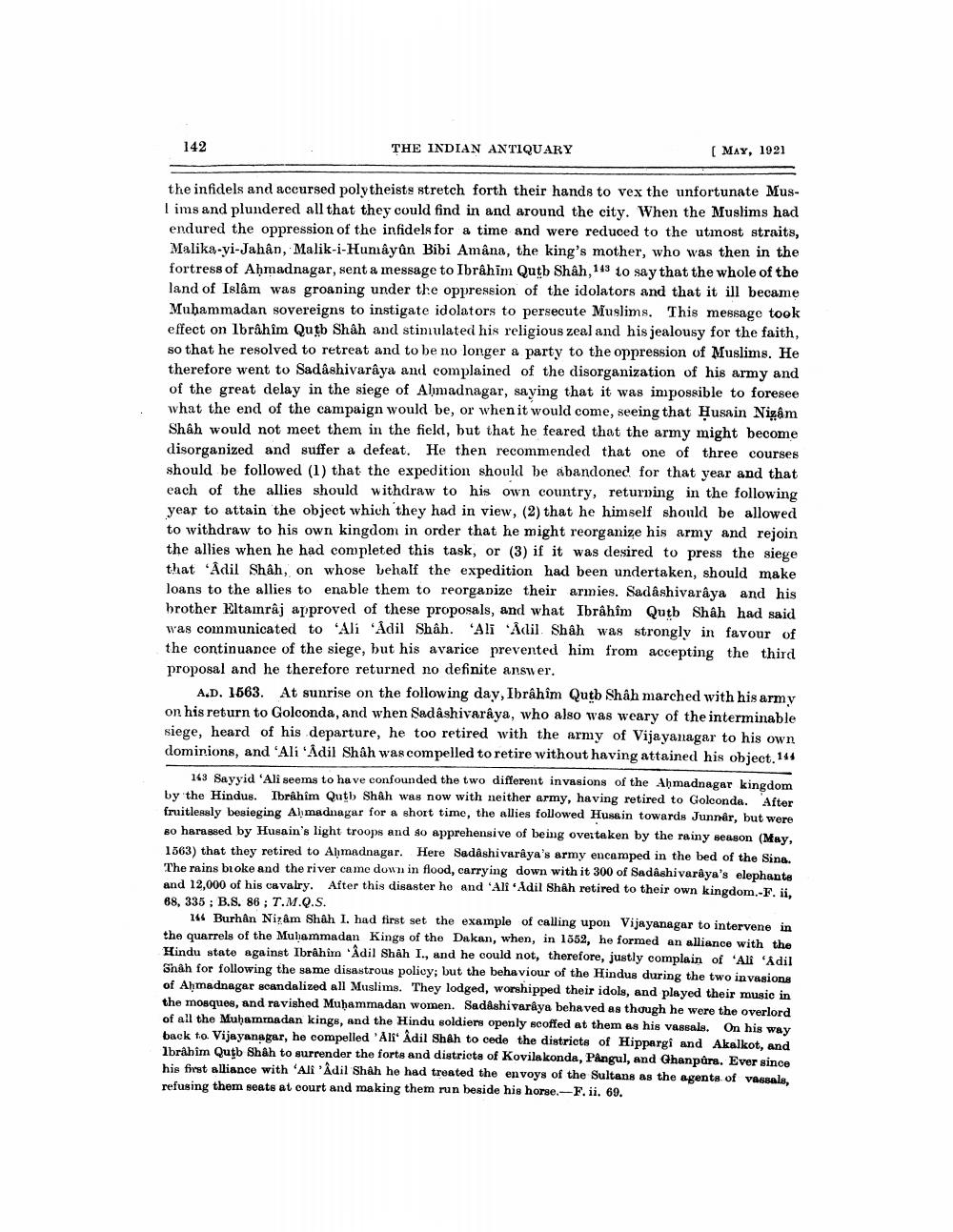________________
142
THE INDIAN ANTIQUARY
(MAY, 1921
the infidels and accursed polytheists stretch forth their hands to vex the unfortunate MusI ims and plundered all that they could find in and around the city. When the Muslims had endured the oppression of the infidels for a time and were reduced to the utmost straits, Malika-yi-Jahân, Malik-i-Humayûn Bibi Amâna, the king's mother, who was then in the fortress of Ahmadnagar, sent a message to Ibrahim Qutb Shah, 113 to say that the whole of the land of Islâm was groaning under the oppression of the idolators and that it ill became Muhammadan sovereigns to instigate idolators to persecute Muslims. This message took effect on Ibrahim Qutb Shah and stimulated his religious zeal and his jealousy for the faith, so that he resolved to retreat and to be no longer a party to the oppression of Muslims. He therefore went to Sadashivarâya and complained of the disorganization of his army and of the great delay in the siege of Almadnagar, saying that it was impossible to foresee what the end of the campaign would be, or when it would come, seeing that Husain Nizam Shah would not meet them in the field, but that he feared that the army might become disorganized and suffer a defeat. He then recommended that one of three courses should be followed (1) that the expedition should be abandoned for that year and that each of the allies should withdraw to his own country, returning in the following year to attain the object which they had in view, (2) that he himself should be allowed to withdraw to his own kingdom in order that he might reorganize his army and rejoin the allies when he had completed this task, or (3) if it was desired to press the siege that 'Adil Shah, on whose behalf the expedition had been undertaken, should make loans to the allies to enable them to reorganize their armies. Sadashivaraya and his brother Eltamrâj approved of these proposals, and what Ibrahim Qutb Shah had said was communicated to Ali Adil Shah. Ali 'Acil Shah was strongly in favour of the continuance of the siege, but his avarice prevented him from accepting the third proposal and he therefore returned no definite answer.
A.D. 1563. At sunrise on the following day, Ibrâhîm Qutb Shâh marched with his army on his return to Golconda, and when Sadashivarâya, who also was weary of the interminable siege, heard of his departure, he too retired with the army of Vijayanagar to his own dominions, and 'Ali 'Adil Shâh was compelled to retire without having attained his object. 144
143 Sayyid Ali seems to have confounded the two different invasions of the Ahmadnagar kingdom by the Hindus. Ibrahim Qutb Shah was now with neither army, having retired to Goloonda. After fruitlessly besioging Ahmadnagar for a short time, the allies followed Hussin towards Junnar, but were 80 harassed by Husain's light troops and so apprehensive of being overtaken by the rainy season (May, 1563) that they retired to Ahmadnagar. Here Sadashivaraya's army encamped in the bed of the Sina. The rains broke and the river came down in flood, carrying down with it 300 of Sadashivaraya's elephante and 12,000 of his cavalry. After this disaster he and 'Ali Adil Shah retired to their own kingdom.-F. ii, 88, 335 : B.S. 86; T.M.Q.S.
146 Burhan Nizâm Shah 1. had first set the example of calling upon Vijayanagar to intervene in the quarrels of the Muhammadan Kings of the Dakan, when, in 1862, he formed an alliance with the Hindu state against Ibrahim Adil Shah I., and he could not, therefore, justly complain of 'All Adil Shah for following the same disastrous polioy, but the behaviour of the Hindus during the two invasions of Ahmadnagar scandalized all Muslims. They lodged, worshipped their idols, and played their music in the mosques, and ravished Muhammadan women. Sadashivarêya behaved as though he were the overlord of all the Muhammadan kings, and the Hindu soldiers openly scoffed at them as his vassals. On his way back to Vijayanagar, he compelled 'All Adil Shah to cede the districts of Hippargi and Akalkot, and Ibråhim Qutb Shah to surrender the forts and districts of Kovila konda, Pangul, and Ghanpare. Ever since his first alliance with 'Ali Adil Shah he had treated the envoys of the Sultans as the agents of vassals, refusing them seats at court and making them run beside his horse.-F. ii. 69.




